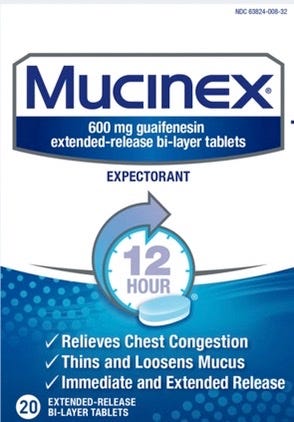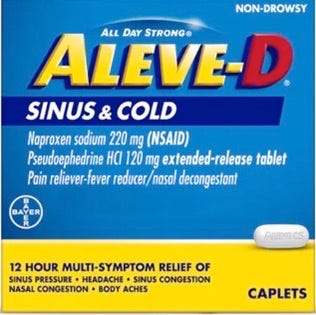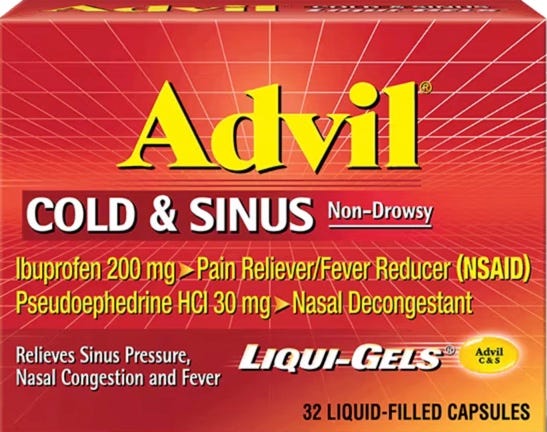My Drugs of Choice for all your Cough and Cold Needs
I’ve noticed that many of those around me are coming down with awful coughs, stuffy noses, and pounding sinus headaches. Cold symptoms are still relevant despite the COVID-19 pandemic, especially during the holidays.

I’ve noticed that many of those around me are coming down with awful coughs, stuffy noses, and pounding sinus headaches. Cold symptoms are still relevant despite the COVID-19 pandemic, especially during the holidays. I’ve decided to share my preferred over-the-counter medications to treat any cough or cold symptoms.
Wet Cough
Coughs usually fall into two categories: wet or dry. A wet cough feels like you’ve got mucous trapped in the back of your throat or inside your chest. You can hear a gurgling sound when you cough. You need a product to help dislodge and dissolve the mucous build-up to treat this cough. Here are my go-to medications:
Mucinex

Whenever I get a question about a wet phlegmy cough at the pharmacy, I recommend Mucinex first. The generic name for Mucinex is guaifenesin, which belongs to a class of drugs called expectorants.
An expectorant’s job is to thin the mucous stuck in your chest so that it’s easier to clear. The product I reach for is the Mucinex 12-hour tablets, in which you take one pill every 12 hours to treat a wet cough.
Robitussin DM

My alternate choice to treat a wet cough is Robitussin DM’s product. Robitussin DM is a combination cough product with two medications: guaifenesin and dextromethorphan. Guaifenesin is the expectorant in Mucinex, and dextromethorphan is a cough suppressant discussed in the next section.
Dry Cough
Our second type of cough is called a dry cough. There is no overproduction of mucous with this cough, usually caused by irritants not being filtered from the throat. These coughs sound clear and almost barking. I have two recommendations when it comes to dry coughs.
Delsym

Delsym is my favorite product to use for a dry cough. The product contains a medication called dextromethorphan, which increases the cough threshold. This means that you will cough less throughout the day and nighttime. This medication is taken every 12 hours and shouldn’t be used daily for long periods.
Sore Throat
When a patient approaches me with a terrible sore throat, I share multiple remedies with them. For temporary relief, I suggest any cough drops with menthol in them. It will numb their throat, which will relieve some pain. Additionally, I recommend over-the-counter pain relievers like Advil, Aleve, or Tylenol. Those will target any pain in the body and help with a sore throat.
Nasal Congestion
My nasal congestion recommendations depend on the patient with high blood pressure because the main medications used to treat nasal congestion can increase blood pressure. That is an important question when recommending a product for nasal congestion. Here, I will go over my recommendation for those with high blood pressure and normal blood pressure.
Sudafed

Sudafed is pretty popular in cough and cold treatments and is more tightly regulated by the FDA due to its similarity to methamphetamine. Sudafed can be found behind the counter of a pharmacy, and you need an ID to purchase it. The medication found in Sudafed is called pseudoephedrine. Pseudoephedrine, taken by mouth, constricts the blood vessels in the nose and decreases mucous production. I recommend this medication for those with normal blood pressure because the medicine tends to increase blood pressure.
Afrin

Afrin is a nasal solution used to treat nasal congestion. I recommend this product for those with high blood pressure because the medication stays locally in the nasal cavity and doesn’t constrict blood vessels in any other place. Patients can only use it continually for up to 72 hours to watch out for this product. After 72 hours, the product can cause rebound nasal congestion, making the symptoms worse than before.
Sinus Pressure/Headache
There are two main products I recommend for sinus pressure and headache, which have already been mentioned. Usually, pain relief is what patients are seeking.
NSAID + Sudafed


Combining a pain reliever like Advil or Aleve with Sudafed is my go-to recommendation for those with sinus pressure and headaches. The anti-inflammatory will help decrease the pain and inflammation, while the Sudafed will decrease the sinus pressure by constricting the blood vessels. The names of these products are called Advil Cold and Sinus and Aleve-D Sinus and Cold. These combination products are also sold behind the counter of a pharmacy because they contain pseudoephedrine. Please use caution when taking these medications if you have high blood pressure.
NSAID alone
Taking Advil or Aleve by themselves might also do the trick for sinus pressure and headache. The pain relief could help both the stress and headache. If you do not want to take pseudoephedrine, just the anti-inflammatory medications would still work.
Fever

The best over-the-counter medication to break a fever is Tylenol. This medication is antipyretic, meaning that it reduces fevers. Other over-the-counter pain relievers like Advil or Aleve do not have that effect. Taking Tylenol as the package instructs will help break a fever.